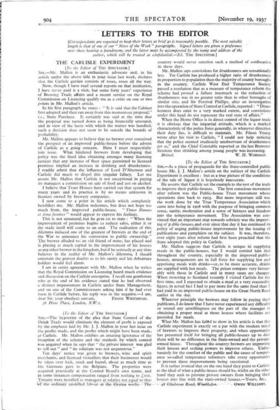LETTERS TO THE EDITOR
[Correspondents are requested to keep their letters as brief as is reasonably possible. The most suitable length is that of one of our " News of the Week" paragraphs. Signed letters are given a pieference over those bearing a pseudonym,' and the latter mat be accompanied by the name and address of the author, which will be treated as c6nfidertlial.=Ed. THE SPECTATOR.]
THE CARLISLE EXPERIMENT
• [To the Editor of THE SPECTATOR.]
SIR,—Mr. Mallon is an enthusiastic advocate and, in his article under the above title in your issue last week, declares that the Carlisle garden consists of roses, roses all the way. Now, though I have read several reports on that institution,
I have never paid it a visit, but some forty years' experience of Brewing Trade affairs and a recent service on the Royal Commission on Licensing qualify me as a critic on one or two points in Mr. Mallon's article.
In his first paragraph he states : " It is said that the Cabinet
first adopted and then ran away from this momentous proposal," i.e., State Purchase. It certainly was said at the time that the proposal was turned down as being financially unsound, and in view of the haste with which the matter was handled, such a decision does not seem to lie outside the bounds of probability.
Mr. Mallon appears to believe that no brewer ever conceived the prospect of an improved public-house before the advent of Carlisle as a going concern. Here I must respectfully join issue. What hindered brewers from developing that policy was the fixed idea obtaining amongst 'many licensing justices that any increase of floor space permitted to licensed premises implied an increase in drinking and drunkenness. I readily admit that the influence of Lord D'Abemon and Carlisle did much to dispel this singular fallacy. Let me assure Mr. Mallon that Carlisle is not exceptional in paying its managers a commission on sale of food and not on alcohol.
I believe that Trust Houses have carried out that system for many years and its practice is by no means unknown in licences owned by brewery companies.
I now come to a point in his article which completely bewilders me. Mr. Mallon welcomes, but does not hope too much from, the improved public-house. " Timeo Danaos et dona ferentes " would appear to express his feelings.
This is not unnatural, but he gees on to state : " When the
improvement of premises begins to reduce sales, either it or the trade itself will come to an end. The realisation of this dilemma induced one of the greatest of brewers at the end of the War to announce his conversion to public ownership." The brewer alluded to -,7 an old friend of mine, has placed and is placing as much capital in the improvement of his houses as any other brewer in the kingdom, but if he seriously at any time believes in the reality of Mr. Mallon's dilemma, I should entertain the gravest doubts as to his sanity and his debenture holders would feel alarm.
I am in entire agreement with Mr. Mallon when he writes that lhe Royal Commission on Licensing heard much evidence and discussion on the Carlisle enterprise. I recall one gentleman who at the end of his evidence stated that he had observed a distinct improvement in Carlisle under State Management, and on one of the Commissioners asking him if he had ever been in Carlisle before, his reply was in the negative.—I am, dear Sir, your obedient servant, FRANK WHITBREAD. 36 Hans Place, London, S.W.r.
















































































































 Previous page
Previous page